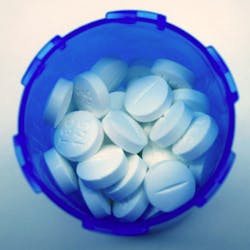Sponsored: Improper management of pharmaceutical waste can cost dentists a fortune
This article originally appeared in the Principles of Practice Management e-newsletter. Subscribe to this informative twice monthly practice management ENL here.
While the advancement of new medicines and pharmaceuticals to prevent diseases, improve patients’ health, and save lives has been remarkable, the improper management and disposal of these drugs can be harmful to public health and the environment, and may impact the operation of your dental practice.
In order to determine the proper protocols for your practice, it’s important to consider that the DEA has a special category for those dealing with pharmaceutical waste called Generators of Controlled Drug Substances Waste. This includes pharmaceuticals manufacturers, distributors, wholesalers, and health-care providers, such as dentists, who allocate them to patients.
Ensure compliance by taking these simple steps
Find your color scheme
Correct management of waste starts before pharmaceuticals are ever dispensed. Make sure your practice is compliant before and after use of medication by maintaining proper storage protocols in your inventory practices. While containers for these different types of waste come in many different colors to help practices stay organized, there’s no federally-mandated color scheme for pharmaceutical waste, and it is vital that each type of waste is stored and disposed of separately. For example, black containers are frequently used for wastes regulated by the Resource Conservation and Recovery Act (RCRA) to highlight their dangerous nature. Find a color scheme that works right for your practice and stick to it.
Be aware if the different methods
Different types of pharmaceutical waste require different methods of disposal depending on their schedule and composition.Compliant documentation and accurate reporting to the DEA is just as important to your overall compliance as proper disposal. Shipping pharmaceutical waste with the help of a licensed DEA reverse distributor is convenient and can help your practice avoid costly fines.
Mind your Ps and Us
Different pharmaceutical waste can fall under multiple categories and jurisdictions. For example, beyond the category of controlled substances, which is overseen by the DEA, pharmaceutical waste can also be classified as hazardous by the EPA under the Resource Conservation and Recovery Act (RCRA). Under RCRA, hazardous wastes are listed in categories such as “D-listed” or “U-listed,” and are generated from common industrial processes, specific industries, or discarded commercial products. There is also “acutely hazardous” waste (“P-listed”), such as warfarin and epinephrine, which can pose a direct threat to fresh water sources if disposed of improperly. In addition, you should be aware that the Department of Transportation has its own rules and regulations for the transportation of hazardous materials under the Hazardous Materials Transportation Act (HMTA).
Ask an expert
It’s vitally important to work with experts who can provide the proper materials and methods of appropriate logistics, as well as assured destruction for pharmaceutical waste. If your practice is not certified to handle disposal of pharmaceutical waste, engage with an expert who can help. Public organizations such as the DEA can help connect your practice with resources to stay on top of changing regulations, and specially licensed private environmental service companies can help guide you through the process to ensure compliance.
Daniel Moran is a Senior Director of Healthcare Solutions for Covanta Environmental Solutions, a leading provider of environmental services across a wide range of industries, including pharmaceuticals, consumer products, health and beauty, food, automotive, chemicals, and other industrial manufacturers. For more information on pharmaceutical waste management visit, covanta.com/Our-Solutions/Sustainable-Materials-Management/Reverse-Distribution.
For the most current practice management headlines, click here.
For the most current dental headlines, click here.
Sources
1. https://www.epa.gov/hwgenerators/management-pharmaceutical-hazardous-waste
2. http://www.hercenter.org/
3. http://hwpharms.wikispaces.com/
4. https://www.epa.gov/hwgenerators
5. http://info.mcfenvironmental.com/blog/best-practices-for-how-to-dispose-of-pharmaceutical-waste
6. https://www.psqh.com/analysis/pharmaceutical-waste-is-your-facility-at-risk/

